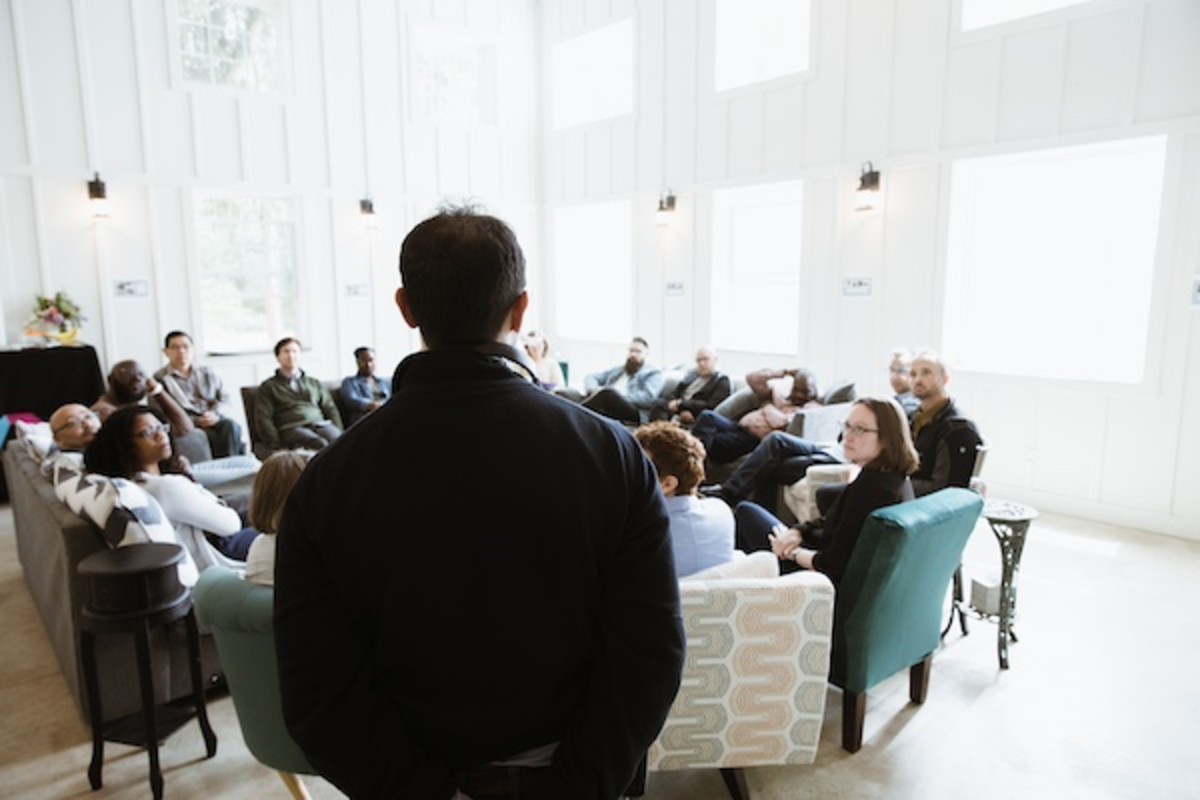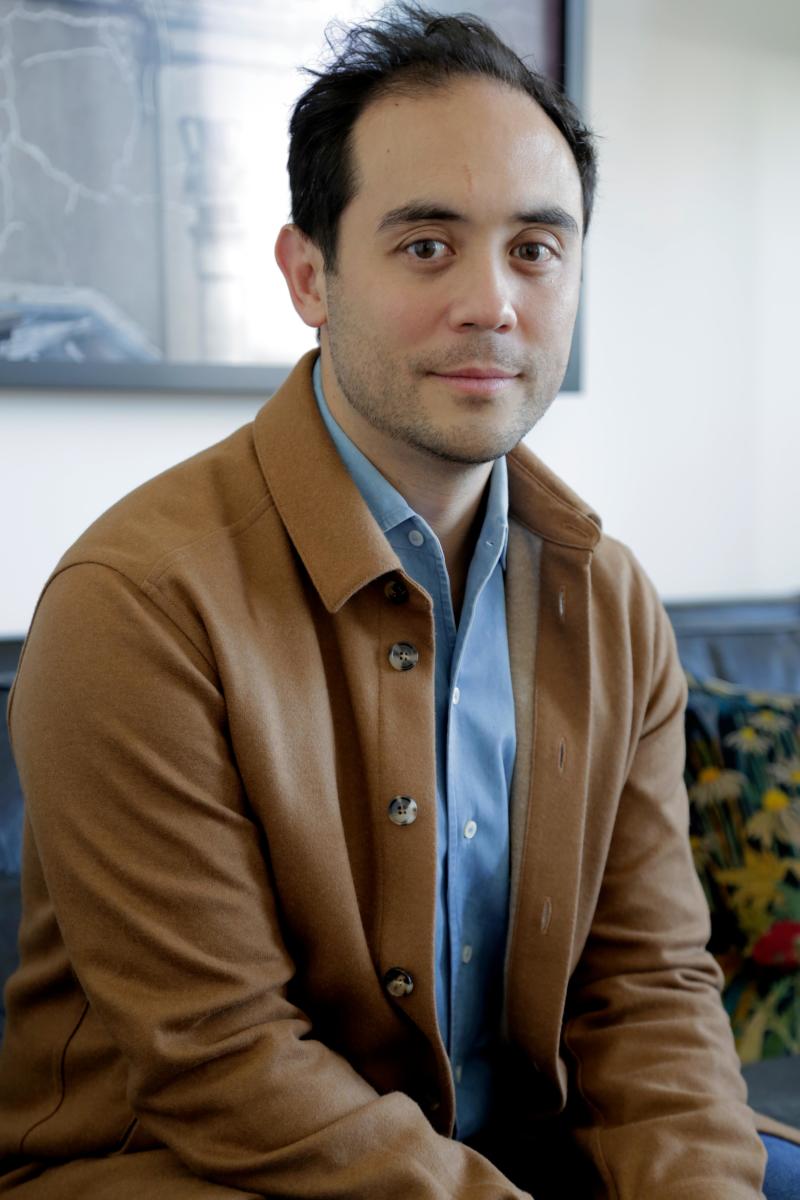Filmmaker Nicholas Ma discusses the process behind making the documentary, from his collaboration with Morgan Neville, the writing process in editing, and discovering the through-line to tackling tough subjects with the pastors, and more.
Susan Kouguell for Script Magazine
I had the pleasure to speak with award-winning director Nicholas Ma about his new documentary Leap of Faith. This poignant film follows 12 diverse Christian pastors in Grand Rapids, Michigan of varying theological, racial and political identities and ideologies. Brought together by Michael Gulker of The Colossian Forum, the pastors struggle with some of today’s most contentious issues. The divisions between them become apparent and test both their common belief in the universal importance of love and kindness and the bonds they build over the course of a year.
Nicholas Ma is an award-winning director, writer and producer based in Brooklyn. Ma produced the WNBA documentary Unfinished Business (directed by Alison Klayman), which premiered at the 2022 Tribeca Film Festival. His feature directorial debut, Mabel (San Francisco International Film Festival, 2024), which he co-wrote with Joy Goodwin, was awarded the Sloan Prize.
Nicholas has been a DOC NYC fellow and Film Independent Fellow.

Kouguell: Leap of Faith is about faith but it’s universal. It’s not about one particular religion. The seed of this project started with the 2020, Wall Street Journal written by Janet Adamy, which introduced you and Morgan Neville to the Reverend Michael Gulker, a Mennonite minister based in Grand Rapids, Michigan.
Ma: Something you just said struck me. The film is about faith but it’s universal and I completely agree. Morgan Neville and I made a film together Won’t You Be My Neighbor? about Fred Rogers and that movie was universal but also about faith. I think there’s a way we think of faith as something that narrows us and says we’re part of a smaller group, as opposed to something that broadens us.
That’s what was so interesting about the WSJ article, Michael Gulker was saying we all have specific opinions that sometimes contradict each other but what if there was a way of that being true and also our being in community together. There was this interaction between faith and universality, which I think is countercultural in the humanist community and the faith community.
Kouguell: Talk about your collaboration with Morgan Neville in this film.
Ma: Morgan is one of those filmmakers who has a capacious understanding of the form of documentary, he’s like working with a master chef. He’s a wonderful mentor. Morgan was so helpful with his farsightedness to bring everything to life, such as the direct-to-camera conversations that have a special continuity to them. Instead of being prescriptive, he would offer suggestions, such as ‘Here’s what I think you’re trying to do and here’s how we can make it better’.
It was a curious process for him too. He’s such a prolific director and it’s been a long time since he’s worked in this vérité space and it was energizing for him too.
Kouguell: Did you work from a script?
Ma: Tamara Maloney is my editor; she’s such a brilliant human, editor and writer and I’m so grateful for her. There is almost a suspicion: what does it mean to write for a documentary? There is no narration in this film. If you’re trying to reveal the truth, to distill the truth of something that occurs over more than a year into 90 minutes, there’s a part of that that immediately requires a kind of writing, and with this film, even more so.

Often in documentaries you can find specific moments, for example: let’s take a two-minute chunk out of this scene and that’s really it. Whereas here, it was actually about distilling a conversation that happened over a course of 90 minutes into a scene that is three minutes long. That requires looking at each conversation, and asking, how are we layering this to find the through-line into three minutes, and then do that repeatedly with each conversation.
We had to work so much from the transcript in order to see what is the broader argument made here and how do we do justice to that broader argument into something that doesn’t feel like shorthand, which I think is gesturing at an argument that you already know or feels fragmentary. Figuring that out was really challenging.
What we discovered was if you’re going to do something that has such complicated and contentious ideas at its core, you have to do justice to that argument but you also have to give enough space on either side of it in order to digest it. That was a huge part of the writing process as well.
Kouguell: That space was indeed there to give the viewer time to consider and digest. It was also evident that you did not have an agenda as filmmakers. In the film, you tackle tough subjects, including sexuality, gay marriage, policing, and racism. I imagine some of the pastors might have been reluctant to share their thoughts for fear of consequences from their parishioners. There’s a lot at stake here. Talk about building trust with the pastors.
Ma: The pastors all knew how to not say something if they didn’t want to. They’re very practiced at it. The leap of faith for them at that moment was to choose to say something they didn’t know how to say. How do you say that thing that you don’t know how to say?
I think what allowed us to really be vulnerable was having a shared question. The question wasn’t, ‘How are we going to resolve our differences about sexuality’, the question was, to put it into universal terms, ‘Can we all belong to each other or are some differences too great?’ What made it possible is that it’s possible for either answer to be true. It’s not like I needed the answer to be one way or they needed the answer to be another way. It was an exploration. It allowed us to say, there can’t be an agenda here because we don’t know the answer. It’s up to us to choose what the answer is.
That’s also what led to all the surprises in the film. Everyone was making these decisions as they went along, ‘Do I belong to you, do I want to try?’ You see that kind of fumbling that we’re so afraid of in this world. We feel like we have to get the right words, the right engagement or it’s better not to do it all. They definitely said we need to be careful but also, what does that mean and what are the consequences of doing that. It doesn’t always look pretty.
![[L-R] Pastor Line Exercise; Artie Lindsay, Dr. James Stokes, Joan VanDessel, Ashlee Eiland, Tierra Marshall, Ben Kampmeier, Kim DeLong, Chase Stancle, Troy Hatfield, Andrew Vanover, Molly Bosscher and Cornelius Ting, LEAP OF FAITH (2024).](https://scriptmag.com/.image/t_share/MjEwNDY3Mzk5OTAyNzAxNTQ1/lof_photo-5.jpg)
[L-R] Pastor Line Exercise; Artie Lindsay, Dr. James Stokes, Joan VanDessel, Ashlee Eiland, Tierra Marshall, Ben Kampmeier, Kim DeLong, Chase Stancle, Troy Hatfield, Andrew Vanover, Molly Bosscher and Cornelius Ting, LEAP OF FAITH (2024).
Courtesy Picturehouse
Kouguell: The line exercise the pastors do requires them to respond to questions only by stepping forward or backward, is a critical dramatic moment in the film.
Ma: Yes. They have to walk towards or back to each other. The movement is physically happening and the question is, can it happen less literally too.
Kouguell: Your father, the world-renowned cellist, Yo-Yo Ma has performed at various events in support of this film, as well as appearing with you and Morgan on many broadcast interviews. How is it to be working together in this way?
Ma: We share a common yearning, a belief that we want the world to feel more whole and want to be part of that. I think the film brought us closer. He’s a spirit animal for our project.
I think about the experience of sitting in a concert hall, listening to him play and you look around and see people who have been emotionally moved, and you also know that you don’t know who any of them are, and none of them know who you are, and you may believe all sorts of different things but you have been moved by the same experience. It’s what I hope for with a movie like this. It’s going to challenge you more than a piece of music because you do hear opinions and see people act in ways you do or don’t agree with, but my hope is that at the end of it, you watch it with someone you don’t know and you look around and ask what could that mean as possible?
Leap of Faith is now out in selected theaters across the country.